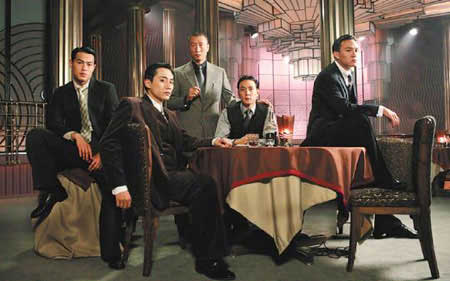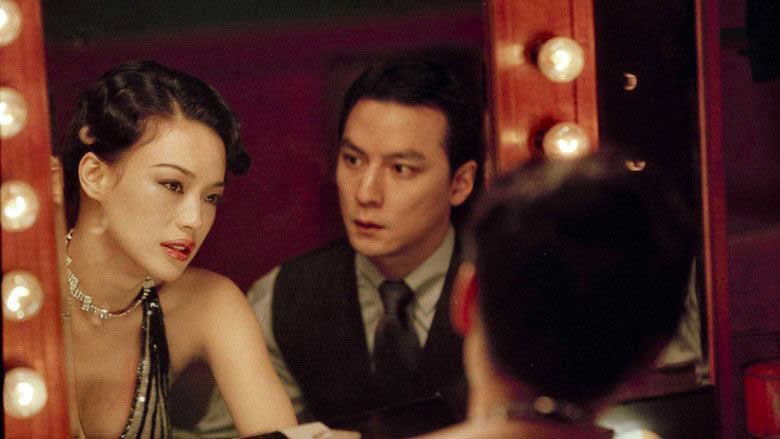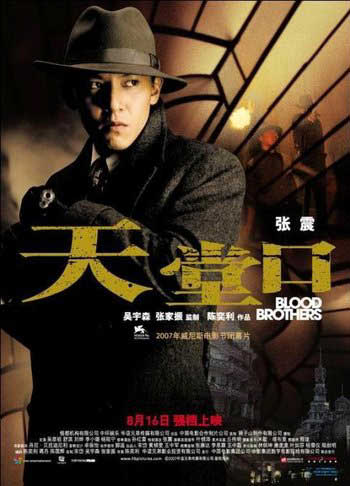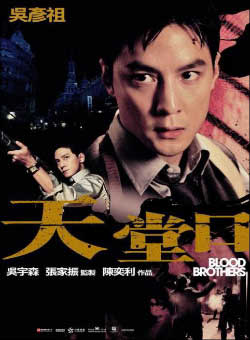


Yet the film doesn’t hold up to any of this build
up as it comes across as an uninspired pastiche of other films – most directly
Woo’s own Bullet in the Head but also with echoes of Shanghai Grand, A Better
Tomorrow and The Godfather trilogy wafting through. But while those films
had drive and energy that never let go, Blood Brothers sluggishly moves along
with its narrative feet often encased in sticky caramel colored melodrama.
Tan appears to be so enraptured with the rich look of his film and of his
actors, that he stops constantly for ego sized close-ups and drawn out intimate
conversations saturated in artificial lighting. These characters do a lot
of talking and very little doing as they come across as a set of Chinese Hamlets
unable to be decisive. Chinese film titles are often much more flowery than
the English ones and though I have no idea what this one would translate to
it should have been called The Angst Ridden Shanghai Gangsters. What struck
me most was that I read that Woo edited the film, but it feels both too long
in some ways and too short in others and often contains some awkward alternating
POV shots so that you have to wonder what he had to work with.

As soon as the viewer is introduced to the three
main protagonists’s one can quickly guess what the arc of this story will
be – Kang (Liu Ye) is the dominant one in the group with his quick temper,
fast fists and cruel eyes, his brother Hu (Tony Yang) is the passive follower
and Fung (Daniel Wu) is the sensitive one. They live in an idyllic country
village that feels like it is straight out of a movie set where everything
looks squeaky clean and every one looks happy – except for Kang who wants
the three of them to go to the big city of Shanghai to make their fortunes.
Hu complies easily enough and Fung reluctantly agrees to leave his ailing
mother, his filial sister and his lovely doting village belle to make some
money. Initially, Shanghai is tough as they get jobs as rickshaw drivers (watching
the urbane Wu trying to look like a coolie is almost worth the price of a
ticket), but they find working for the merciless Boss Hong (Sun Hong-lei)
to be more rewarding and they soon find themselves rising up in his criminal
hierarchy. This life style though begins to drive a wedge between the three
friends as Kang is willing to do anything to make good, the shell-shocked
Hu takes to drink and staggers through the remainder of the film and Fung
is conflicted between friendship and morality. Enter into this picture the
gorgeous Lulu (Hsu Chi), a nightclub chanteuse and the girlfriend of Boss
Hong. Fung takes to her like a fish to water and his sweet lass from home
becomes a distant memory – but Lulu may have something going on the side with
Hong’s main enforcer Mark (Chang Chen) who kills with the cool of his namesake
from A Better Tomorrow but seems modeled on Simon Yam’s character from Bullet
in the Head.

None of this potential drama and conflict ever carries any emotional ballast because there is zero chemistry between any of the characters beginning with the three friends. In the same way that a good romance needs chemistry between the leads, a male bonding film needs for the viewer to believe that these people are really friends who will die for one another – something that Woo was the master of in his Hong Kong films – but these just feel like three stock characters thrown on to the set and told that they are friends and so when they begin to turn on one another it creates no sense of tragedy but instead just a sense of relief that the film has finally reached this inevitable page in the script. That is perhaps the most disappointing aspect of the film – it just feels so unoriginal and anyone with a background in Hong Kong film will find no surprises along the way as it reaches its Better Tomorrow inspired but poorly choreographed finale - the only surprise is how little you care.
